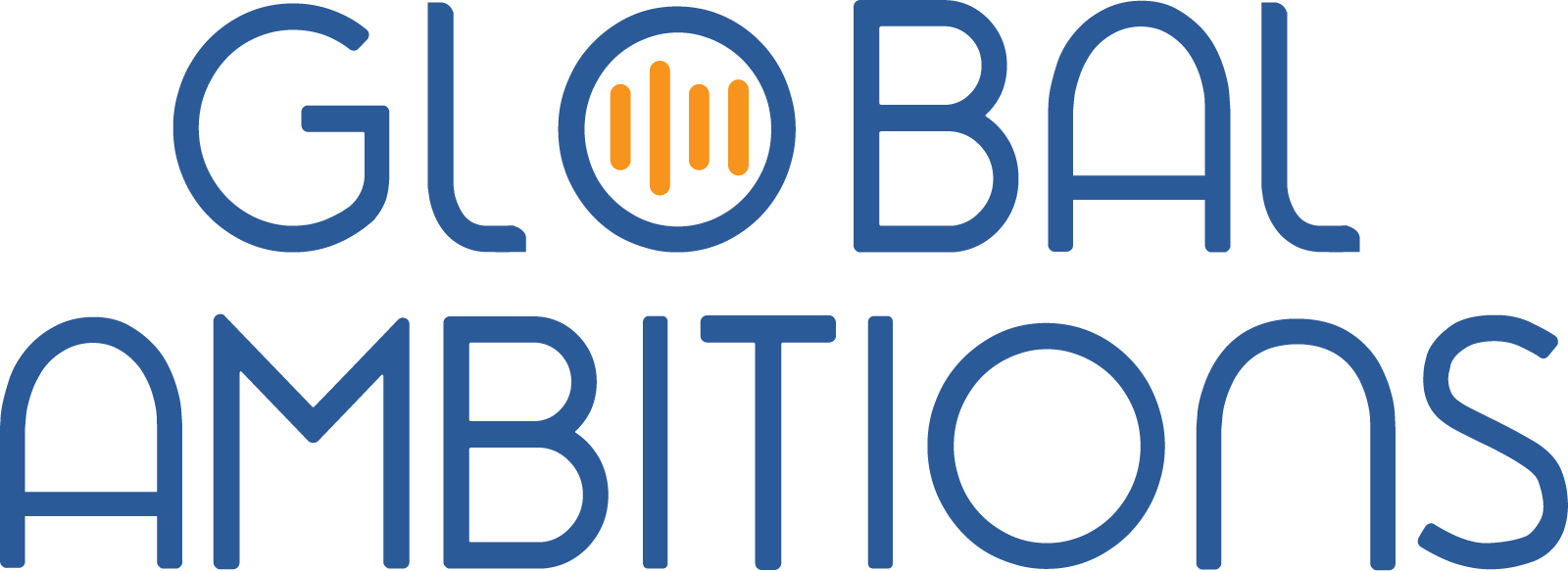With Erica Haims of Haims Consulting
Below is a complete transcript of the episode.
Stephanie Harris 0:15
Hi, I’m Stephanie Harris, and I’ll be your host for today’s global ambitions podcast. In today’s episode, we’ll be looking at the marketing side of localization and how to avoid mistakes that will cost a company dearly down the line. Today’s guest is Erica Haims of Haims Consulting. Erica, welcome to the show.
Erica Haims 0:34
Thank you for having me, Stephanie, It’s always a delight to speak with you.
Stephanie Harris 0:38
All right, well, can you please start us off by telling us briefly about you and your background.
Erica Haims 0:44
I consider myself a sort of outsider of the localization industry because my experience is mostly in globalizing content for marketing deliverables. So I’ve had to version content so it could be available around the world. And that’s been very interesting to see that since leaving that position, and then moving into localization, learning about how vast the industry is, how it’s growing, working on deliverables that have so many different variations, and versioning that you’re doing. You are marketing to a country, not necessarily localizing in language.
Erica Haims 1:29
And it’s been really interesting to see all these other companies now come up and having… the company I worked for was Apple, but now seeing that small to mid-sized companies are also working with content. So, I’d like to think that my experience is going to help the localization world as they venture more into deliverable land. So that’s a little bit about me.
Stephanie Harris 1:56
What is the biggest challenge you faced in regards to getting those localization insights, integrated into a whole process and discussion early on?
Erica Haims 2:05
I have seen, that things almost had to break. And then the next time you get into the conversation earlier. So I saw that happening, and then for me, that enabled me to get into the conversation earlier and early. Because people would say “we’re not localizing”, but I would always run around the studio saying, you’re always localizing even when you’re not localizing. And then managers of mine would say, “well that’s versioning, not localization.” I just have this belief in my gut, and soul, that it is.
Erica Haims 2:39
And people who are language professionals and culture professionals, keep track of a project from beginning to end so that when someone picks it up eight months later, they have all the information they need. Then that’s the ideal way to work. Then things just don’t fall through the cracks and people aren’t, let’s say, building assets from scratch. And just sort of, you know, as they say reinventing the wheel. That costs a lot of money, and time and room for mistakes. So, I would get brought in the conversation earlier and earlier because I’d say “You know what? I could have prevented that mistake from happening.”
Erica Haims 3:15
And that wound up working better, then saying, “You need me.” And they would say, “Well why?” and maybe I didn’t sell it right. But actually, something breaking really sold my point.
Erica Haims 3:28
And then she’s getting in the room. At first, it was eight weeks than it was earlier and earlier, and earlier. To, we’re actually kicking off a project, we’re gonna invite Erica so she can talk about it. So she can actually not talk. Absorb, and carry the information from beginning to end.
Stephanie Harris 3:50
So the mistake is almost… just not getting in the room would be the biggest mistake that you’ve seen people have in that sort of situation?
Erica Haims 3:59
Right. Not having the right stakeholders in the room. Identifying the key stakeholders, having a room, but then the stakeholders themselves need to know what rooms they need to be in so it’s not just the responsibility of the person who’s holding the meeting. I think it’s the responsibility of especially the person who is in charge of globalizing, localizing, whoever those people. You can’t have everybody in the room. It’s not a town hall. Its as minimal an amount of people as possible, but the right people. That is key in proving your case that “I’m the right person.”
Stephanie Harris 4:36
How did you approach the VPs or the directors of the project? So you know you need to be in that room, how did you approach them, did you have to put together your whole case and then come to them with it, or how did you go about that?
Erica Haims 4:50
Luckily we would have these things called post mortems, which I think now they’re called hindsights, but they’re called a post mortem. And usually, the cross-functional producer will meet with everyone to get their feedback on the project to find out what could we have done better. And I come with my list of things based on the production teams and, and anything that I saw that could have been better. So, those meetings were the best meetings to come in and you come in with all of these examples.
Erica Haims 5:23
Another great thing to do is to have presentations on what is localization, what does my team does. Onboarding is really important. And when somebody new starts you onboard them in. You bring them in and you say this is what I do, this is who I am. This is how I can help you. If you come across this type of question, I get your answer. And having those reminders as well also helped to make sure you’re going to be aware of issues real early on. Really That’s all it is.
Erica Haims 6:01
I think there’s a big wall there between teams sometimes, and there really isn’t. So, I was breaking silos but they said why would a designer care that this asset going global that they’re working on the US deliverable. The main deliverable, the main project. I use the word deliverable a lot because it’s marketing. But I find that when you speak to designers and you say, “Look at what happened to your asset when it went to Japan.”
Erica Haims 6:32
And they’re like, “oh.” And because designers take pride in their work, and then they think about it, they’re like, “alright yeah, I’ll never create a flat file again. I will hand off my asset when I’m done with it. I will not hold on to it.”
Erica Haims 6:52
It’s just that awareness will they’ll say, I didn’t even know that the local I created wound up in a reseller in Africa. I had no idea that they would need to change the UI. You know, so it’s just education and that’s part of the evangelizing and just letting people know, “oh I didn’t know. Now I know.” And then it’s subconscious. They’re like I know someone’s going to touch this. People I think are shocked at how simple it is.
Stephanie Harris 7:23
Okay, what is one example from your experience, one mistake that happened, and a situation where you were able to come back and say, no, let’s not do this and you can advise people to watch out for these sorts of things? Because maybe they could use them in their own case to present to the other teams why they need to be involved.
Erica Haims 7:42
Yeah, so many examples with globalizing assets you can use so many examples from this happened in country. And you can look at a particular project, you know, there may not be something that went out wrong but it had to be recreated. And that’s something you will see and say you know we had to completely reprint this because that was sort of a French curse in there. And it was caught way down the line. So, we’ve got to put validation in place earlier in your process, because we can make sure that this properly validated in this situation.
Erica Haims 8:27
So those are things where maybe we did prevent the mistake from going out but we prevented it too late to save money, or burnout your team because they had to stay till midnight fixing it, or what have you.
Stephanie Harris 8:44
What’s one thing that you’ve seen where you tried it with a team and it worked just really well and you’d like to say to our listeners, you know, try this?
Erica Haims 8:53
For me, the biggest thing that’s worked for me is bringing people together. So I believe in breaking through silos, and finding out what other people do. They don’t have to give away their secrets, but for example, I brought in designers from my team, and then, within even the same company, I brought in designers from another team and had them speak. And basically, we said this is our asset. This is how we build an asset. And they say, oh, but this is how we build an asset.
Erica Haims 9:29
Instead of thinking… over here we were at the same company, and they’re both thinking we’re crazy and they’re crazy, but they didn’t understand how we use each other’s assets. So for their designers to see how we may take like a store environment that’s digital and print it super big. And they probably never thought we would do that with their asset. Where we’d have to change all these different things. Let’s say, you know, for example, Apple has stores available in like 155 countries. It might be more now, but it was 155 when I was there. So, you have to think about these variables, and then maybe, I don’t know, let’s say it’s 20 countries that you’re going to have these print deliverables and or whatever, but you’re just never thought…wild
Erica Haims 10:15
And so it was really while, instead of saying, because I would hear conversations in the background from my own teams and “I don’t understand why they don’t do it our way because our way is awesome” or “why they didn’t know we would wind up one day doing this” because you’re just sort of in your zone. And then when you get the asset, you’re like, I got to recreate this. That’s not cool. Wouldn’t it be nice if they create their assets in Illustrator instead of Photoshop? Just silly things like that.
Erica Haims 10:15
Having those types of conversations where I bring these people who have sort of these similar roles together. It was just amazing. I would just let them speak in their own language to each other, and it wound up making so many more future projects easier. They were facilitated by the fact that they, like I said, just in the back of their minds they knew, Oh, maybe we should rethink if we should use Illustrator versus Photoshop. Or, how we’re handing off these images or where we’re storing these images, or what metadata needs to go with… I mean just, you think about all this stuff and that’s always been the most successful.
Erica Haims 10:15
Bringing engineers from my team and someone else’s team together, and then let them geek out a little, that’s what they start doing, and then really starting to understand, oh, that’s why this was created this way. And they start to have respect for each other, and they learn from each other, they know the other one exists, they may call them up and say something, you know, what would you do in this situation. So really connecting those people. I’ve seen a lot of success through that.
Stephanie Harris 10:15
I think these are all very useful and good insights for folks who are working in these sort of positions of localization within a big company. So thank you so much for coming on. I guess my final question to you, that we ask everyone, is there anyone else you would recommend that I get in touch with to potentially come on the show at a future date?
Erica Haims 12:20
I would really love to talk to people who are in the marketing arena and allow people in localization, to see how vast the industry really is. And maybe really further my argument that localization is language, and it’s so much more. And we really need the language professionals in more conversations regarding content and marketing in original content. Because their voice is so important. Because they’re the subject matter experts of the country. So introducing more creative people who, for example, people who are based in other countries for major companies that take marketing, and then they make it appropriate for a global audience which includes language, what dialect, but, what you know, but what colors are insulting, to replacing photography, all the things. So that’s that, that I would love.
Stephanie Harris 13:29
Awesome, Well I look out for that email from you later then. But yeah, let’s go ahead and close out thank you so much for coming on this has been great.
Erica Haims 13:37
Thank you, Stephanie. I love talking to you.

Erica Haims




